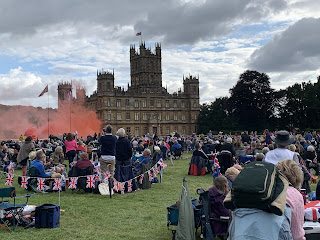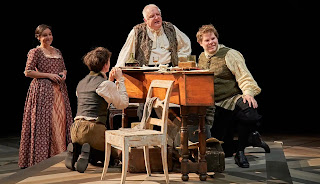Domestic restrictions regarding COVID-19 ended in England on 19 July, pretty much in line with the traditional start of the summer school holidays. Most of the events of “the season” … the Chelsea Flower Show, Henley, Glastonbury, etc. … were either cancelled or curtailed, but the ability to welcome crowds again ushered in a high summer that felt almost normal.
For us, the first two weeks of August brought a welcome return to the Highclere Battle Proms, Shakespeare at our local pub and our first foray into a London theatre for 16 months.
I’ve written of the Battle Proms here multiple times over the years. Its unchanging features have never been more comforting than after our long, forced separation from normality. The Regency cavalry display. The opening act of WW2 classic songs. The Red Devils parachute display drop. The Spitfire flyover. The classical music concert with the rousing programme of patriotic tunes and fireworks that never varies.
There were two new elements for us this year. We chose to hire a marquee rather than bringing our own. It was supposed to simplify the organisation of a large family group, though five of our planned eight were stuck on the continent due to continuing quarantine rules for foreign travel. At £122 is was a humorously palatial splurge for the three remaining ticket holders, but we realised it came with distinct advantages. A guaranteed spot meant we didn’t have to arrive early and join the mad scramble to claim a space. We could turn up at leisure and set up in the first row of marquees with a straight view to the stage. None of the hassle of pitching our tent or, even better, trying to strike it and find all the tent pegs and ropes in the dark.
Second, since our last Battle Proms we’ve met the Earl and Countess of Carnarvon. I wrote about the surprisingly intimate cocktail party on their lawns here, which gave us the familiarity to say hello. They didn’t remember us, of course, but the earl returned our greetings and the countess stopped for a lengthy chat. As ever when exposed to the modern aristocrats running the enterprises built around England’s stately homes, I’m amazed by their easy familiarity and ease with “the people”. Highclere’s owners floated amongst the crowds like any other attendee, looking and interacting like the people next door. You can’t run a hospitality business without that talent, of course, but it always amuses me to imagine what the founders of these dynasties would think of the way “aristocracy” has evolved.
The event could have been concocted by the English tourism board to give life to the fantasy most foreigners have of this country. A benevolent lord and lady welcoming the locals into their grounds. Genial, well-behaved crowds spreading lavish picnics on the sloping lawns of a stately home, flags fluttering in a gentle breeze, a view of picturesque countryside stretching for miles and the slowly setting sun turning a world of green and blue into gold and dark purple.
English tourism would also do well to celebrate Fuller’s “Shakespeare in the Garden” series. Growing up in America, my early exposure to The Bard was all high culture to be slaved over at school and given worthy respect in serious theatres. That happens here too, of course, but in the land of Shakespeare’s birth there’s enough familiarity to bring a more casual treatment, plus more actors trained in his works. Thus we get David Mitchell and Ben Elton’s Upstart Crow on screen and stage, and a hefty schedule of outdoor performances throughout the summer by small companies in the grounds of stately homes. Fuller’s pubs make things even merrier with their “Open Bar” company.
These talented young actors know their Shakespeare, but they’re also skilled at improv, physical comedy and audience interaction. We saw them put on The Merry Wives of Windsor at The Calleva Arms in Silchester in 2019 and were curious to see what they’d do with the much more challenging Love’s Labour Lost. They updated bits of the text with contemporary humour, added music and slipped in and out of character and gender. We watched just four of them take on a story about of trio of men wooing another trio of women, who interact with at least five significant secondary roles. With basic costume changes, a couple of dummies assembled from balloons and a tremendous amount of skill, the company managed to tell a complex story and keep us entertained.
That’s no mean feat for what I consider to be one of Shakespeare’s most difficult comedies. It’s an early one, much in need of editing … no surprise it holds both Shakespeare’s longest scene and longest soliloquy … and the characters are neither particularly memorable nor loveable. It’s a romantic comedy without a resolution or a happy ending. But its biggest challenge is being laden with rapid-fire wit and pedantic word play at a pace that would be familiar to fans of Hamilton. As with that modern musical, I suspect contemporary audiences would have needed to see Labours three or four times to digest all the dialogue. With more than four hundred years of linguistic evolution since then, it’s hard for even well-read Shakespeare fans to follow. The fact that four young actors could transform it into a jolly, comprehensible romp in a pub garden was truly amazing.
Our theatrical outing a week later was much more serious. Bach and Sons explores the difficult relationship between the magnificently talented Johann Sebastian and his two eldest sons. Firstborn Wilhelm was reportedly a prodigy, but frittered his life away in drink and undemanding jobs. Carl Friedrich lacked his father’s spark, but hard work sharpened his proficiency enough to become a court musician to Frederick the Great and a composer whose work is still played. (I was a bit disappointed that the much younger sibling, Johann Christian, who went on to be known as “the English Bach”, didn’t feature.)
Written by award-winning Nina Raine, directed by London theatre giant Nicholas Hytner and starring the wonderful Simon Russell Beale, you’d think there would be enough talent here to create something as memorable as Amadeus. No such luck.
Bach and Sons can’t decide what it wants to be. On one side, it’s an exploration of J.S.’s music and genius. On the other, it’s the story of parental favouritism and the trauma that fault inflicts on a family. Amadeus offered a similar mix of genius profile and everyman story (in that case, professional jealousy), but did it much better. With Bach and Sons, I think people without a solid background in the music and the history might struggle to keep up. And while the family dynamics delivered enough melodrama to bring tears to sensitive eyes at the end, the whole thing was entertaining rather than profound. Good, but not great. I suspect the flaws are most evident in the fact that the relatively small role of Frederick the Great (played with a masterful mix of vulnerability, megalomania and charm by Pravesh Rana) stole the show comprehensively. I left the theatre thinking a play about him, starring Rana, would have been far more exciting than the time I’d just spent with the Bachs.
All that said, if you’re a fan of Bach and his music I’d still recommend this as an excellent night out. If you don’t have that foundation as a starting point, I’d pass. Bach and Sons is on at The Bridge Theatre through 11 September.
Despite my joy of being in public at these three events, the spectre of COVID-19 still haunts us, of course. Even though it was an outdoor activity, Highclere reduced ticket sales by 40% to ensure plenty of room between family groups, and it was fascinating to watch how strangers … even in the most gregarious circumstances … now instinctively give each other a wider berth. Staff at all the concession booths wore masks and guests were respectively asked to do so while moving around the festival grounds. The same mask protocol was in place at our pub. The Bridge, more sensitive because they’re indoors, kept buffer seats between booked groups, asked everyone to remain masked throughout, kept their coat check closed, didn’t serve food and requested that people pre-book interval drinks online to reduce the potential contact that comes with queuing. These are tolerable irritations for guests but must be cutting into producers’ profit margins severely. So while life is starting to appear normal, we have a long way to go.



No comments:
Post a Comment